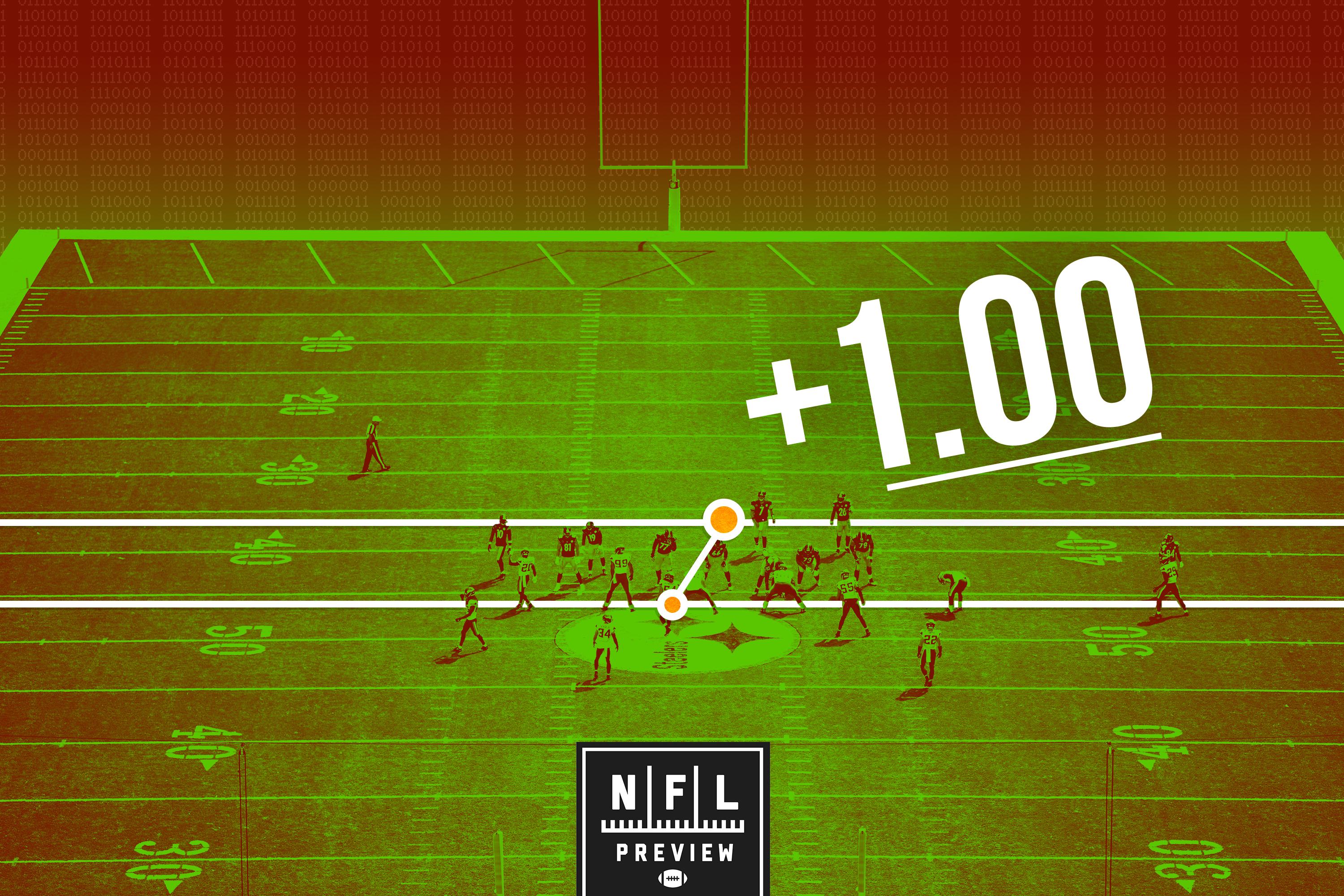
Forget the “stats are for losers” talk. Football’s analytics revolution is upon us. We’re spending today exploring how a deeper understanding of data is changing the sport—and the way fans consume it.
Last offseason, ESPN made a major change to its fantasy platform, making point per reception scoring the default format for all leagues. In its press release, ESPN called PPR “a higher-scoring, more action-packed way to play fantasy football.”
Nothing could better encapsulate why the PPR format has risen in popularity so much in recent years. PPR creates more points, and for many fantasy players, more scoring is more fun. PPR, though, was primarily popularized due to strategic concerns; it balances out the scoring between positions and lessens the fantasy dependency on touchdowns.
And yet, standard-scoring leagues remain because PPR creates as many problems as it solves. It drastically changes how certain running backs and receivers are valued, places emphasis on small, dink-and-dunk plays over more exciting boom-or-bust ones, and awards points when a player simply touches the ball. Luckily, there’s an alternative that patches up the issues in both PPR and traditional scoring. It’s time to introduce the true solution to the PPR-vs.-standard debate: point per first down.
Fantasy value will never be a true reflection of actual football value, but this fake sport is at its best when it attempts to be both fun and tied to reality. PPR may be more fun than traditional scoring, but by handing out points for simple receptions, it strays further from real football.
PPR creates a “double dip” effect. When a player catches a football, he already generates fantasy value with the yards he picks up. But a PPR system creates odd scenarios. For example, a 4-yard reception is no more valuable to a real football team than a 4-yard run, yet under PPR scoring, the catch would be worth 1.4 points while the carry would be worth 0.4—less than a third of the value. A zero-yard reception is given as many points as a 10-yard rush. Hell, a player could catch a pass, run 5 yards behind the line of scrimmage, get tackled, and still be awarded with 0.5 points. It’s just bizarre.
This is where PPFD comes in. Sometimes, a 4-yard reception really is worth more than a 4-yard rush: when that pass picks up a first down. Rewarding a player a point for a receiving or rushing first down (excluding passing first downs) is a promising way to increase scoring, balance out position groups, and decrease touchdown dependency—without a double dip.
To get a better idea at how standard scoring, PPR, and PPFD differ, here’s a look at how the top 120 FLEX players (RB/WR/TE) would have fared under each of those systems last season:
Point Per First Down Scoring in 2017
The way PPR affects positions is immediately apparent. A full 29 of the 31 biggest gainers under the system (compared to standard scoring) are wide receivers or tight ends, while 24 of the biggest 25 fallers are running backs. By comparison, PPFD has a healthy mix of positions among both risers and fallers.
What’s even more striking is how much larger a difference PPR makes as compared to PPFD. Under PFFD, no player jumped more than 17 spots, while a whopping 40 players moved up or down more than 17 spots under PPR. PPR advocates will often point out that the scoring system can make certain pass catchers (like Browns running back Duke Johnson, for example) more relevant in fantasy, but it makes just as many players irrelevant. Derrick Henry and Jonathan Stewart each fell an unbelievable 45 places under PPR—they went from decent players to virtually unplayable afterthoughts. Higher up the list, players like Latavius Murray (36th to 69th), Marshawn Lynch (35th to 62nd), Alex Collins (31st to 56th), and Jordan Howard (12th to 35th) all took dramatic tumbles. These are decent players. They don’t belong in the fantasy basement simply because they don’t catch many passes.
On the other end of the spectrum, PPR rewards players who are catching a high volume of passes, but aren’t necessarily generating yards or touchdowns for their team. The top gainer is Jack Doyle (94th to 58th), who had the fourth-lowest yards per reception in the NFL last year. Jarvis Landry is the 11th-highest gainer, jumping from 31st in standard to 12th in PPR. Landry is a solid player, but it seems exaggerated to value him 12th most among all receivers, backs, and tight ends. In PPFD he still rises, but only to 22nd, which feels like a more appropriate place considering his on-field value and production.
PPFD, by comparison, rewards a different type of player: those who didn’t get so lucky in the touchdown department. Danny Amendola (116th to 99th) jumped 17 spots under PPFD, and he had just two touchdowns on the season. Jay Ajayi (66th to 52nd) had a wild touchdown drought last year, not finding the end zone a single time until after he was traded to Philly in Week 9. He jumped 14 spots in PPFD—but falls an incredible 28 spots under PPR because he doesn’t haul in many passes. Ajayi is one of the best examples of where PPR fails: His value suffered because he both didn’t catch passes or pick up touchdowns, but he was still a solid value to his team. PPFD balances that out.
The losers under PPFD, meanwhile, are the guys who had incredible touchdown luck. Will Fuller (99th to 116th) fell 17 spots after recording seven touchdowns on just 28 catches on the season. Tyreek Hill (16th to 27th) dropped 11 spots because despite having the 18th-most receptions on the season, he tied for the 27th-most receiving first downs (and tied for the 54th-most combined receiving and rushing first downs). Other fallers (O.J. Howard, Tyler Kroft, Brandin Cooks, et al.) also had touchdown rates that were a little too good to be true. But none of these guys dropped the way that players like Henry, Stewart, Murray, and Lynch did in PPR.
The 2017 season offers a tantalizing look at how PPFD could work in fantasy. More points get awarded across the board, bringing the FLEX positions more in line with quarterbacks, but they’re awarded more evenly, without an inexplicable boost for pass catchers.
Even as PPR becomes more popular, the cracks in the system have begun to appear. Many leagues award only half a point per reception, attempting to split the difference between PPR and standard in an attempt to avoid overvaluing receivers and undervaluing ground-first running backs. But 0.5 PPR is a band-aid solution: It still creates wild swings in positional value and rewards opportunities instead of actual production. And it still double dips.
The way to truly get the best of both worlds is by using PPFD.
Of course, PPFD is not perfect—while a first down has real, on-field value, it is still arbitrary to award a single point to capturing one. But fantasy football is always going to be a bit arbitrary, and that’s a good thing—the noise and randomness help make fantasy great. PPFD keeps much of that noise without drowning it in thousands of points for receptions.
There is one final hiccup to PPFD: ESPN does not currently support the format. But Yahoo does, so running a PPFD league is more than doable.
Fantasy football boils down to one thing: fun. There, too, PPFD offers promise. Imagine on Sunday when a player stretches for a first down—only now that play has fantasy implications, too. Those “depends on the spot” plays now become like mini-touchdowns for fantasy purposes. And just imagine the trash talk when a fantasy game is decided by an index card.


